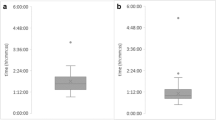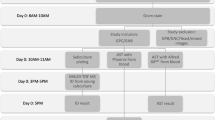Abstract
The aim of this study was to evaluate the performance of the new automated system Alfred60AST which is based on light scattering technology for rapid susceptibility testing directly from positive blood cultures as well as its applicability in the routine laboratory workflow. We evaluated 176 significant episodes of bacteremia due to 92 Gram-negative and 84 Gram-positive bacteria. The antimicrobial agents tested were ceftriaxone, ciprofloxacin, gentamicin, meropenem, piperacillin-tazobactam, and colistin for Gram negatives and cefoxitin, vancomycin, linezolid, and daptomycin for Gram positives. Concordance assessment was performed in comparison with our routine method, Vitek2 (bioMérieux). Discrepancies were resolved with MICRONAUT-S (Merlin) or E-test (bioMérieux). Out of 690 susceptibility determinations, 94.05% showed categorical agreement (CA) with the routine method and this percentage increased to 94.49 after discrepancy analysis. There were 1.45% very major errors, 3.33% major errors, and 1.16% minor errors (decreased to 1.45, 3.04, and 1.01 after discrepancy analysis). The CA for most of the antibiotics was above 90% except for daptomycin for Gram positives (87.30%) and ceftriaxone for Gram negatives (88.23%). The concordance was slightly better for Gram negative than for Gram-positive bacteria (94.30 versus 93.70%, respectively). The total turnaround time for a complete Alfred60AST result was 6–6.5h. The evaluated method gave rapid and reliable results in a few hours, versus 48h for the conventional one. Implementing this technology in routine workflow allows clinicians to optimize the treatment on the same day of blood culture positivity with potential positive clinical benefits and impact on antibiotic stewardship.
Similar content being viewed by others
References
Kirn TJ, Weinstein MP (2013) Update on blood cultures: how to obtain, process, report, and interpret. Clin Microbiol Infect 19(6):513–520. https://doi.org/10.1111/1469-0691.12180
Rhodes A, Evans LE, Alhazzani W et al (2017) Surviving sepsis campaign: international guidelines for management of sepsis and septic shock: 2016. Critical Care Medicine 45(3):486–552. https://doi.org/10.1097/CCM.0000000000002255
Rudd KE, Johnson SC, Agesa KM et al (2020) Global, regional, and national sepsis incidence and mortality, 1990 – 2017: analysis for the global burden of disease study. Lancet 395(10219):200–211. https://doi.org/10.1016/S0140-6736(19)32989-7
Kumar A, Ellis P, Arabi Y et al (2009) Initiation of inappropriate antimicrobial therapy results in a fivefold reduction of survival in human septic shock. Chest 136(5):1237–1248. https://doi.org/10.1378/chest.09-0087
Maurer FP, Christner M, Hentschke M, Rohde H (2017) Advances in rapid identification and susceptibility testing of bacteria in the clinical microbiology laboratory: implications for patient care and antimicrobial stewardship programs. Infect Dis Rep 9(1):6839. https://doi.org/10.4081/idr.2017.6839
Idelevich EA, Reischl U, Becker K (2018) New microbiological techniques in the diagnosis of bloodstream infections. DtschArzteblInt 115(49):822–832. https://doi.org/10.3238/arztebl.2018.0822
Edmiston CE, Garcia R, Barnden M, DeBaun B, Johnson HB (2018) Rapid diagnostics for bloodstream infections: a primer for infection preventionists. Am J Infect Control 46(9):1060–1068. https://doi.org/10.1016/j.ajic.2018.02.022
Özenci V, Rossolini GM (2019) Rapid microbial identification and antimicrobial susceptibility testing to drive better patient care: an evolving scenario. J AntimicrobChemother 74(Suppl 1):i2–i5. https://doi.org/10.1093/jac/dky529
Simon L, UghettoE GA, Degand N, Lotte R, Ruimi R (2019) Direct identification of 80 percent of bacteria from blood culture bottles by matrix-assisted laser desorption ionization – time of flight mass spectrometry using a 10-minute extraction protocol. J ClinMicrobiol 57(2):e01278–e01218. https://doi.org/10.1128/JCM.01278-18
Azrad M, Keness Y, Nitzan O et al (2019) Cheap and rapid in-house method for direct identification of positive blood cultures by MALDI-TOF MS technology. BMC Infect Dis 19(1):72. https://doi.org/10.1186/s12879-019-3709-9
Peker N, Couto N, Sinha B, Rossen JW (2018) Diagnosis of bloodstream infections from positive blood cultures and directly from blood samples: recent developments in molecular approaches. ClinMicrobiol Infect 24:944–955. https://doi.org/10.1016/j.cmi.2018.05.007
Charnot-Katsikas A, Tesic V, Love N et al (2018) Use of the Accelerate Pheno System for identification and antimicrobial susceptibility testing of pathogens in positive blood cultures and impact on time to results and workflow. J ClinMicrobiol 56(1):e01166–e01117. https://doi.org/10.1128/JCM.01166-17
Barnini S, Brucculeri V, Morici P, Ghelardi E, Florio W, Lupetti A (2016) A new rapid method for direct antimicrobial susceptibility testing of bacteria from positive blood cultures. BMC Microbiol1–8. https://doi.org/10.1186/s12866-016-0805-5
Van den Poel B, Meersseman P, Debaveye Y, Klak A, Verhaegen J, Desmet S (2019) Performance and potential clinical impact of Alfred60 AST (Alifax ®) for direct antimicrobial susceptibility testing on positive blood culture bottles. Eur J Clin Microbiol Infect Dis 39(1):53–63. https://doi.org/10.1007/s10096-019-03690-0
Sánchez-Carrillo C, Pescador P, Ricote R et al (2019) Evaluation of the Alfred AST ® system for rapid antimicrobial susceptibility testing directly from positive blood cultures.Eur. J ClinMicrobiol Infect Dis 38(9):1665–1670. https://doi.org/10.1007/s10096-019-03595-y
Jorgensen JH (1993) Selection criteria for an antimicrobial susceptibility testing system. J ClinMicrobiol 31(11):2841–2844. https://doi.org/10.1128/JCM.31.11.2841-2844.1993
Giordano C, Piccoli E, Brucculeri V, Barnini S (2018) A prospective evaluation of two rapid phenotypical antimicrobial susceptibility technologies for the diagnostic stewardship of sepsis. Biomed Res Int 2018:6976923. https://doi.org/10.1155/2018/6976923
Boland L, Streel C, De Wolf H, Rodriguez H, Verroken A (2019) Rapid antimicrobial susceptibility testing on positive blood cultures through an innovative light scattering technology: performances and turnaround time evaluation. BMC Infect Dis 19(1):989. https://doi.org/10.1186/s12879-019-4623-x
Anton-Vazquez V, Adjepong S, Suarez C, Planche T (2019) Evaluation of a new rapid antimicrobial susceptibility system for Gram-negative and Gram-positive bloodstream infections: speed and accuracy of Alfred 60AST. BMC Microbiol 19(1):268. https://doi.org/10.1186/s12866-019-1654-9
Descours G, Desmurs L, Lam T et al (2018) Evaluation of the Accelerate PhenoTM system for rapid identification and antimicrobial susceptibility testing of Gram-negative bacteria in bloodstream infections.Eur. J ClinMicrobiol Infect Dis 37(8):1573–1583. https://doi.org/10.1007/s10096-018-3287-6
Lutgring JD, Bittencourt C, TeKippeEM CD, Hollaway R, Burd EM (2018) Evaluation of the Accelerate Pheno System: results from two academic medical centers. J Clin Microbiol 56(4):e01672–e01617. https://doi.org/10.1128/JCM.01672-17
Acknowledgements
Part of the study was presented at the 30th ECCMID Abstract Book 2020.
Availability of data and materials
The datasets generated or analyzed during the current study are available from the corresponding author on reasonable request.
Author information
Authors and Affiliations
Contributions
Conceptualization: Paraskevi Mantzana; methodology: Fotini Netsika, Maria Arhonti, Eleni Kandilioti, and Maria Kyriakopoulou; formal analysis and investigation: Georgios Meletis; writing - original draft preparation: Paraskevi Mantzana; writing - review and editing: Paraskevi Mantzana, Georgios Meletis, and Efthymia Protonotariou; comments on previous versions of the manuscript: Georgia Kagkalou, Olga Vasilaki, Areti Tychala, Efthymia Protonotariou, and Lemonia Skoura; supervision: Lemonia Skoura. All authors read and approved the final manuscript.
Corresponding author
Ethics declarations
Ethics approval and consent to participate
Testing was performed in accordance with the ethical standards as laid down in the 1964 Declaration of Helsinki and its later amendments. No specific approval from our institutional ethics committee was required as testing was performed on residual samples and results were not used for patient’s therapeutic management.
No informed consent was needed for this study since samples were taken as part of the standard patient care and used anonymously.
Consent for publication
Not applicable.
Competing interests
The authors declare no competing interests.
Additional information
Publisher’s note
Springer Nature remains neutral with regard to jurisdictional claims in published maps and institutional affiliations.
Rights and permissions
About this article
Cite this article
Mantzana, P., Netsika, F., Arhonti, M. et al. Performance evaluation of Alfred60AST rapid susceptibility testing directly from positive blood cultures in the routine laboratory workflow. Eur J Clin Microbiol Infect Dis 40, 1487–1494 (2021). https://doi.org/10.1007/s10096-021-04191-9
Received:
Accepted:
Published:
Issue Date:
DOI: https://doi.org/10.1007/s10096-021-04191-9




